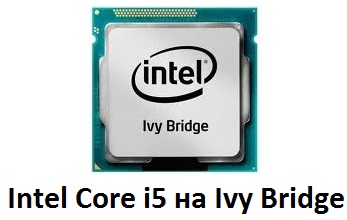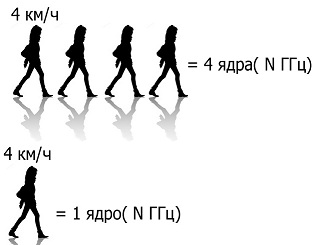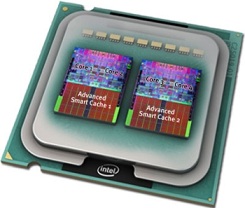If you decide to assemble a computer, and not buy a ready-made package, then first you should think about which processor you want to install in the system unit. The characteristics of the processor play a big role in And it, in turn, affects everything else. In other words, if you buy a weak old generation processor, you won't be able to buy a new motherboard. Of course, you can buy something, but you can’t install the selected processor and this board into the computer at the same time.
A connector, otherwise known as a socket. This is the main point that you need to pay attention to when choosing a motherboard for a processor or vice versa. The board has one connector designed for a certain type of processor. For example, boards with an LGA socket are only compatible with processors that have an LGA775 socket.
Clock frequency. The larger the value of this frequency, the more operations the processor can perform in a certain period of time.
front side bus. Or, if in a simple way, the frequency of the processor. This is such a special bus that also serves to transfer information between all devices inside system block and himself
Cache. A kind of RAM, but only in the processor itself, which serves as an intermediary between RAM-memory and the processor itself.
Consider the characteristics of the processor individually and in more detail. Let's start with the connector. When choosing a processor and board, you need to make sure that the connectors on the processor and on the motherboard are the same. Otherwise, you will have to change some of them. Of course, the newer and more powerful the processor, the newer and more productive the board should be, respectively, it will already be designed for a new and powerful processor.
For example, the old "Intel Celeron" processors come with LGA775 sockets. Processors can also be placed on the same socket. Intel Core 2 Duo" and "Intel Core 2 Quad". In this regard, this socket is convenient, because on the same board you can install Various types processors that differ in both price and performance.
It should be noted that when buying an "Intel Core i3" processor, you need to pay attention to the generation of the processor you have chosen. Since there is a first and second generation, which are both considered Core i3, and at the same time they differ in sockets. Do not confuse.
Also an important point, but not the most important. So you should not look at the frequency value, but you should pay attention to the cache and bus frequency. The clock frequency can be increased if desired. How to change It's not exactly easy, and not everyone can decide, because you can manage to ruin the processor. The process of increasing the frequency is called overclocking. You can overclock through the BIOS.
More important is the cache. If the processor is not quite new, then it has two levels of cache. And if it’s new, that is, of the latest generations, then such models also have a third-level cache.
Due to the fact that the cache stores information that is currently needed, the larger the cache in the processor, the fewer accesses to RAM will be, since the most necessary is already inside. But if the model is old, then there is not enough data, and as a result, the processor constantly accesses random access memory. And this slows down the work and reduces productivity.
L1 cache is available on all processors. The memory in it is very, very small, but the fastest. It is needed for the internal needs of the CPU core. For example, the amount of memory is usually less than 100 KB. But the L2 cache is already designed for the main work, respectively, it has a fairly large amount of memory. In the new good models, it reaches 2-4 megabytes. If the model latest generation, then you will also have an L3 cache. Here the volume is even greater, but the speed is less.
I would like to note once again that the characteristics of the processor play a huge role in the resulting performance of the entire computer.
How true is the statement that "In order to choose the right processor, you need to know a number of its characteristics"? The fact that the processor is one of the most important elements of a computer is known, in fact, to all users. However, on the contrary, not everyone knows how to choose the right processor. Knowing the characteristics of the processor allows you to sort out its capabilities and adequately assess the computing capacity of the future system.
When choosing a processor, it is necessary to remember the complexity of its characteristics, since drawing conclusions about the performance of a particular processor, knowing only one parameter, is at least simply unreasonable. For example, the statement that the processor that has more high frequency has long been obsolete, with the advent of multi-core processors. It is also unwise to choose a processor by the number of cores, since there are other equally important parameters. Therefore, it is so important to follow an integrated approach and carefully study all the parameters when choosing a processor.

CPU
- the main circuit for the operation of a computer, one might even say, the heart of any personal computer. Without the processor, its normal functioning is impossible. More recently, the processor, having an arithmetic logic unit, could produce the simplest arithmetic operations. However, modern processor able to perform a variety of calculations. In addition to computational operations, he is also able to independently place information between the cells of his memory. One of the most important features of the microprocessor is that it is independently capable of making decisions and, on the basis of this, choosing a further course of action according to a given algorithm.The processor can execute a fairly large number of commands, which are presented in the form of combinations loaded into the command register by combinations consisting of numbers. Since, in fact, it is impossible for the human brain to remember such sets of numbers, a special analogue consisting of words was specially created for each command. This made it possible to create an entire assembly language.
Processor performance depends on the number of operations it performs per unit of time. To perform any operation, a certain number of processor clock pulses are required. In turn, the number of clock pulses depends on the presence of the number of transistors in the processor.
Through the use a large number transistors, the possibility of envelope processing became available, the essence of which lies in the simultaneous execution of several commands. Nowadays powerful processors consist of several million transistors, thanks to which they can simultaneously execute millions of commands in one second and perform the most complex mathematical calculations. The central processing unit is the most complex technological device that corrects and controls the entire operation of a personal computer.
Companies that represent world-class processors (Intel / AMD) have been fierce competitors for many years. The dilemma of which processor better AMD or Intel cannot be unequivocally decided, since the average consumer needs one thing, and the avid overclocker or gamer needs something completely different. Therefore, all processors can be conditionally divided into several types.

Which processor is optimal for the budget sector?
Budget computers can be not only office, but also home. In this area, AMD undoubtedly remains the leader, since the new Trinity, say the A4-5300, is great for home use, when loading any integrated graphics. The Trinity is also ideal for the office fleet, although Pentium Gs are under pressure in this area, as their computing abilities show a higher level.
Best processor for gaming PC.
Class gaming computers is comprehensive, they cover the middle and top segment of all processors, they are equipped with powerful graphics cards, which take on quite a large part of the work in games. Maintaining balance depends primarily on the processor in these computers.One conclusion can be drawn from the analyzed results - the best option for gaming computers is Intel, as they allow you to get a certain backlog for the next few years. Intel Core i5 on Ivy Bridge is undoubtedly the best way, while the FX-6300 and Core i3 are also good options for an inexpensive gaming machine.
Processor for resource-intensive computing work.
Encoding and processing audio and video, as well as working with complex graphic applications and any other types of complex computational operations - all these operations can be divided into several threads.
Multithreading is the strong point of the FX-8350, it is ideal for any workload and no desire to spend extra money.
Subject to the availability of finances, you can overpay a little and get a universal i7-3770K, which is suitable not only for playing, but also for work. The Intel FX-8350 is a value for money option that allows you to use your computer for complex computing tasks.
When comparing Intel and AMD processors, of course, there are some controversial points, but each user has his own personal opinion on this matter.
Row AMD processors Phenom represent a family of processors based on the K10 architecture. These processors are widely popular due to their high performance and relatively affordable cost. In our country, they have not yet received due popularity, since this brand is relatively new, in contrast to the highly recommended Athlon and Turion.
General processor parameters:

- Performance is the number of operations it performs per unit of time, measured in flops. The higher the performance, the more commands the processor can process simultaneously.
A socket is a connector on the motherboard, directly the place where the processor is installed. However, when it comes to a processor socket, this means not only the socket on the motherboard, but also the support of this socket by certain processor lines. The socket is needed in order to easily replace a failed processor or upgrade the system to a more efficient processor.

- The clock frequency of the processor is the most common characteristic of the processor, it is determined by the number of its calculations per unit of time and its performance directly depends on it.

- The number of cores - this parameter has been one of the most important when choosing a processor in recent years. The number of cores is selected in accordance with the tasks performed - the more difficult the tasks the machine will perform, the large quantity cores must have a processor.

- Cache volume is a volatile ultra-fast memory that allows the processor to quickly access the necessary, frequently used data. There are several levels of cache memory - the first level, which is the fastest, but has limited dimensions, and the second level, which is slower, but at the same time has a slightly larger volume.
Perhaps every owner of a personal computer wants his PC to be powerful and at the same time not too expensive. When choosing components for a computer, you need to pay attention to many different indicators. The PC processor is one of the most important parts that directly affects the performance of the device.
When choosing CPU for a personal computer, the user should pay attention to the following parameters: manufacturer, connector type (CPU platform), clock frequency, bit depth, number of cores.
There are two main manufacturers of processors: AMD and Intel. Some users think that Intel processors in everything they surpass their competitor, but such people are deeply mistaken. There is no big difference between manufacturers, since all processor models are manufactured at a high-tech level.
connector type
Connector type is one of the most important parameters. In the event that you skip it or forget about it, then the purchased processor may not fit the motherboard, that is, the processor will not be installed in a special slot that is located on it. As a result, the socket number (its model) must completely match the socket located on the computer motherboard. For example, at by Intel some of the most popular are: LGA 2011, LGA 1155 (LGA 775 and LGA 1156 are almost never used today). AMD has sockets: AM3, Socket AM3+ and Socket FM1.
Clock frequency
The clock frequency of the processor is perhaps one of the most well-known parameters when evaluating or choosing it. It depends on it the number of operations that the processor can perform in a certain unit of time. An example is a processor with a clock speed of 3.4 GHz, that is, it can process 3 billion, 400 million cycles per second.
It is worth noting that the clock frequency is far from the only parameter that affects the performance of a PC. That is, if the clock frequency is high, and other components (for example, a video card, RAM, etc.) are not the most popular, then in the end the computer is unlikely to work very fast. It must be remembered that best way out from the situation - if all PC components work "in unison".
Bit depth
The processor speed is also an important parameter. Several stand out: 32-bit, 64 and 128-bit. The latter option is extremely rare, so it does not even make sense to consider it. Regular user A 32 or 64 bit system will suffice. When choosing, it is worth remembering that 32-bit systems support a maximum of 3.75 GB of RAM, and if it is on personal computer more, you need to buy a processor with a 64-bit system.
Number of Cores
The choice of a processor with a certain number of cores directly depends on the type of tasks that will be solved using a PC. For example, if the user will work exclusively with text editors or “light” multimedia applications, then 2 cores will be enough. Otherwise, you need to purchase a processor with a large number of cores.
